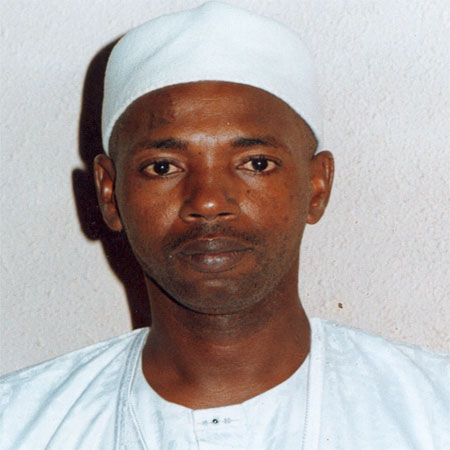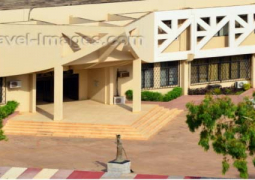
“It is easier said than done!” declared Hamat Bah, reacting to President Yahya Jammeh who recently said about the use of English as the official language, “we are going to change very soon to a local language”.
The leader of the opposition National Reconciliation Party, NRP, was speaking over the week-end, in an exclusive interview with The Point.
According to Hon. Bah, “the implications and ramifications of that are so huge that I don’t think anybody can make that pronouncement, and say so soon, for people to believe you; because there are a lot of things at stake; a lot of issues that needed to be cleared first”.
Number one, he continued, “which language is going to be our official language? Are we going to have the Fulani language, Mandinka, Serahule, Jola or Mandiago, Serer or any of the local languages. Or are we going to look for the biggest languages, and choose them as the official language? This has not been made clear.
“Two, looking at the financial resources required for such a system to operate, it is not just possible for now. Your whole legal system, the courts everything, for example, instead of being in English has to be interpreted in our local languages.
“Do we have our laws written in our local languages? Can judges deliver judgment in our local languages? These are issues; these are some of the few things that we have to talk about, first”.
The NRP leader added: “Number three, your educational system; the whole system has to change. Have you prepared these languages already in written form; and, what alphabet are we going to use? If you are going to have a local language as the official language, which alphabet – French, German, Chinese – to write a language which people can use for communication, and for reading and writing.
“There are a lot of other implications. Are you saying the whole school system, education system, everything has to change soon? I am absolutely calling that to question!”
About local languages being spoken in our National Assembly, Bah said that is happening all over the world. “In Senegal, next door, they speak all local languages in their National Assembly”.
He went on: “We as a party have been saying this all along; that there is a provision in the constitution, which states that the National Assembly could enact a law for local languages to be spoken in the National Assembly.
“That has been in the constitution since it was adopted in 1997. Where was President Jammeh since 1997? He had a majority in the National Assembly; why didn’t he ever enact that law for people to be able to speak their local languages in the National Assembly.
“Where was he in the last 18 years? We want him to tell us. Why now? Why didn’t he do that, when the law had already made it possible for that to happen”.
The opposition party leader then pointed out that speaking your local language in the National Assembly does not make it the official language of a nation. “Senegalese speak all sorts of languages in their National Assembly, but French is their official language”.
He further noted that in East Africa, they are writing Swahili, which is part of the official language. “But then they started this some 20, 30 years ago. When Julius Nyerere started Ujama, part of the process of implementing Ujama, a self-reliance philosophy, was to study in their local languages, particularly Swahili. And that was more than 30 years ago. In Kenya, where they had the Harambee at the time, they also promoted the speaking and writing of Swahili, as part of the process of self-actualization. We had Tesito in The Gambia, but it was never part of the process to change the official language.
“How can you wake up one day and try to compare yourself with people who have started this process, 30, 40 years ago; with you who have nothing in place, and then you want to tell people how soon? I think really that’s unacceptable!”
Hon. Hamat Bah was also asked for his reaction to comments made recently by President Jammeh that the the judiciary cannot be independent, because it is part of the government, which pays judges salaries.
“It is sad that he has made such a comment. It was unnecessary for him to make such a comment. But it shows who Jammeh is, and the nature of his government. He has now portrayed his true self by saying the judiciary in The Gambia cannot be independent. It is very sad.
“But let me tell you one thing. It’s a statement that would deter investment in this country. When investors hear a statement like that; somebody saying your judiciary cannot be independent, you are telling them, don’t come with your money to my country.
“Because, in case of any dispute, they only rely on an independent judiciary to make an independent decision, in accordance with the laws of The Gambia.
“If you have a head of state making such statements, it’s worrisome. I think it is a matter of real concern, for those of us who encourage investors to come and invest in the country, to create jobs for our youths and develop our economy.
“For such a statement to come from the highest authority in the land, the chief executive of this country - that the judiciary cannot be independent - if he has said this, as is being said all over, then I’m sure that’s a sad situation. And I hope he would have a rethink about this statement, and try to correct what he said”, Hamat Bah stated.
Finally, the NRP leader was asked to comment on the fact that recently, his NRP party was denied permits to hold rallies in the Upper River Region by the police, and the fact that the same thing has been happening to the United Democratic Party, UDP. He was asked if they will go on complaining or are contemplating taking legal action for redress in the courts.
“Well, I think, to be honest with you, it cannot continue unless if they want to declare a one-party state. And that would be a coup d’etat against the constitution of the Republic of The Gambia. And the Gambian people would certainly resist that; the era of coup d’etat is gone; there is no way they can overthrow the constitution, and replace it with a one-party dictatorship.
“It seems the actions point towards that, although we have no hard evidence of that, for now, except that what they are doing is geared towards one-party dominance. Since one party goes on campaigning, holding meetings, and rallies, while other parties are refused that fundamental right.
Hon. Hamat Bah continued thus: “We were really disappointed that they disrupted our plans for a convention. We had planned and organized to go on a tour of 122 villages in 10 days in the Upper River Region, URR.
“And, you know, this brings into question the idea of applying for a permit. The issuing of the permit by the police is meant for the use of a public address (PA) system (loudspeaker). When you are to address a huge gathering, you are supposed to use a PA system, under the Public Order Act.
“It is clear they are exploiting that situation, using it to deprive us of our right to carry out our first responsibility as a political party.
“In fact, related to this issue, I have been reliably informed by someone who is a lawyer, that there is this ruling in the supreme court of Ghana, which goes against opposition parties applying for a permit to conduct meetings. The ruling is to the effect that you cannot ask for a permit from your opponent to go and contest against him/her.
“Political parties should be free to go out and campaign, and carry out their responsibility without seeking permission from their main adversary, that is, the party in power”.
He added: “Yes, the police always claim that they want to see that there is peace, there is law and order. They could monitor what we do; we don’t have any problem with that. For all we know, what we do is within the law.
“So, I think really, it has come to a point where we have to go back to the drawing board. Although they’ve said that we reschedule our meeting; that we reschedule our programmes and re-apply, we will put them to task again.
“But I can tell you that it is rather unfortunate, and is not telling well on this country; that they can reject opposition parties’ application to hold meetings.
“I will refer you back to 2010. We were granted a permit by the police. Then, the very police came to disrupt the meeting that we were to hold at the time”. Bah said he defused what would have developed into a crisis, by cancelling the holding of the rally.
“But it shows you how far this regime can go in trying to obstruct the opposition from doing their job.
“There cannot be a one-party state; if they are thinking of that; they would be making the greatest mistake in their lives. Parties must exist and must function, in accordance with the law”.


